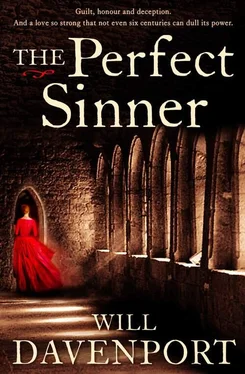My hands and my arms were shaking with exhaustion, holding the butt of the pole, and the wind got up again, whipping the King’s long standard, the Dragon banner of Wessex, as it billowed over my head. I was groaning from the concentrated effort it took to hold that standard upright and immobile and I knew how much it mattered. The flag, tugging at me in the gusts, was the weathercock of the battle, the final symbol. You could see the men snatch glances behind for the evidence that the Royal Will did not waver, that the Royal Person was resolute, sharing their own danger. The upright immobility of that standard was the proof. All very fine, but chivalry died that day.
There, in the torn and bloody earth of Crécy, chivalry died and perhaps I could have saved it.
A drizzle of holy water across my cheek pulled me back from that past, back to my new Chantry. In this other folded valley, a mile inland from the marching waves of Start Bay, I was pretending to kneel down. I was the sole member of the congregation in my own brand-new chapel, and there was nobody else here bar the priest to spot that my backside was still supported by the edge of the pew and my knees were a hand-span short of resting on the hassock. If the priest had noticed, he would have said nothing. William Batokewaye knew what a beating those knees had taken in the service of the King, after all, he’d been there for much of it.
A fine mist of sawdust still filtered down from the roof’s new-cut beams, filling the air with a spray of stained-glass sunlight. The pews smelt of sap and the stone itself showed the fresh face of sliced cheese. It was the forty-fifth year of the reign of his Royal Majesty, King Edward the Third and it should have been a red-letter day.
I watched William stumping up the aisle towards the altar as if he were attacking in the front rank of God’s army. He had always been a good man in a tight corner. Within a year of losing his sword-arm to a Frenchman’s axe, the stump barely healed, he had learnt a left-handed flick of the wrist which reaped soldiers like barley. These days, his only weapon was the holy water, but that same left wrist flicked back and forth to spread eternal life just as he had once spread death.
I was still in my reverie, half nightmare, half myth, embellished over years of remembering until it shone with the untrustworthy precision of a jewel from the devil’s diadem. I was remembering that moment in August of 1346 when three horses, lashed together, thundered at us through the piles of the dead. Then that rain of water arced across my face and shocked me out of my trance.
‘Wake up,’ rasped the priest, glancing back at me. ‘This is all for you, so you might at least pay attention.’
For a moment, I wasn’t quite sure which was then and which was now because that voice belonged to both times, but in those days the priest had all his limbs and I had a clear conscience.
He stopped his chanting and his spraying, stared around him at all the gilt and the fresh paint and the no-expense-spared glory of the place. He pulled an oddly irreligious face.
‘It’s done,’ he said, swivelling to stare at me. ‘Blessed and dedicated. Are you happy now? You should be.’
I could only look at him, and perhaps he saw something in my eyes because he put his thurible down, reached out to take me by the arm and helped me clamber to my feet.
‘Come on. Outside,’ he said.
There was complete and unexpected peace in the courtyard. It was warm for December. I had expected the usual scraping and hammering of the masons working on the rest of my buildings, forgetting I had sent them all off to work in the quarry to guarantee silence for the consecration. There was no sign of human life or so I thought for a moment. Then a tiny movement up above caught my eye. They are as keen as they ever were, my eyes, and I depend on them all the more now that my body is no longer quite so agile. It has always been second nature to watch for that betraying movement in the undergrowth that might save you from an ambush.
There was a man up there on the high ground, the hill which overlooks my village and my Chantry, and I saw him stand up. He didn’t look familiar.
‘Tell me what’s going on,’ William demanded and distracted me. We sat down side by side on a bench, the priest folding his robe under him. He looked at the mud drying on the back of it.
‘I wish you’d put drains down the street,’ he said. ‘I went right over on my arse.’
They like it the way it is, the villagers.’ I replied. ‘It’s always been like that. You know that better than me. This was your place before you ever brought me here. I didn’t even know about it until you told me.’
‘Slapton, eh?’ said the priest, looking around him, ‘It’s thirty years since I lived here last. There’s no kin of mine left here now and I feel almost a stranger. I went away to see the wider world and I’ve learnt to like a drier path to walk on. My grandfather used to call it Slipton because of that slippery old street. If I’m really going to live here again, I might have to do something about that.’ He looked around him and sniffed the air. ‘Now, shall we take stock? What have we got here exactly? One brand-new chapel, for the ease of souls and your soul in particular. One chapel, not staffed by one priest, oh no. Not even staffed by two priests. Your chapel will be staffed by one chaplain, which is to be me, plus five priests and four clerks, am I right? At a cost, I am told, of forty pounds a year. Forty pounds a year for ever. Not to mention a stone-built college for us all to live out the fullness of our lives in prayer, study and, if I know anything about my fellow priests, in dice and wine and maybe even the odd woman.’
I frowned.
‘Oh yes,’ he went on. ‘It won’t all be holy and they may be very odd women.’
That wasn’t why I frowned. I knew William Batokewaye well enough to overlook the licence he had just allowed himself. I’d often heard he had a wife tucked out of sight though if so, that was one of the few things he had ever tried to keep from me. My reputation again, you see. That sort of thing was allowed for lower orders but not for a mendicant friar as he was, or at least had been. Would he presume to bring her here to Slapton? That might test our friendship. I frowned because since that moment in the chapel the echoes of sweet Elizabeth’s forgotten voice, waking all my love, had been gradually fading in my head and now, knowing I had lost the sound of her, I was bereft.
‘My question is this,’ he said. ‘Forgive me, I’m not complaining. I look forward to a comfortable retirement from the rigours of the last thirty years. It is generous of you in the extreme to provide it, but, quite apart from the fact that I would have been prepared to mumble masses for you all day and most of the night for half that sum all by myself, what’s it all for?’ The priest was a year older than me and had been asking me that sort of question for as long as I could remember. Having no arm for defence, he only ever knew how to attack.
‘It’s a Chantry. You know what it’s for.’ I opened my arms to indicate the courtyard in which we sat, the church we had just left and its new stone tower which soared into the air, dominating the little village, overpowering the spire of the village church below.
‘I know what a Chantry’s for. What I’m asking is why do you need one?’
I looked at him, suspecting a trap. He had always been a plain speaker and not one to follow slavishly along dogmatic lines, but this was going too far.
‘You can’t disapprove, William. You and I usually agree on what’s right and what’s wrong. I’ve built it so you and your priests will sing masses for my soul and for Elizabeth’s.’
Читать дальше












